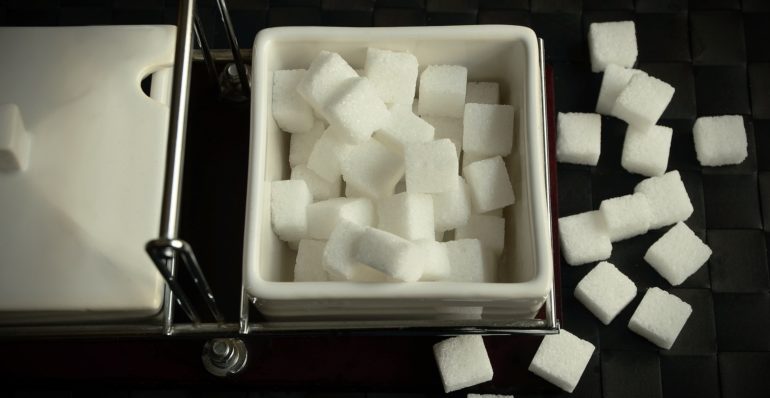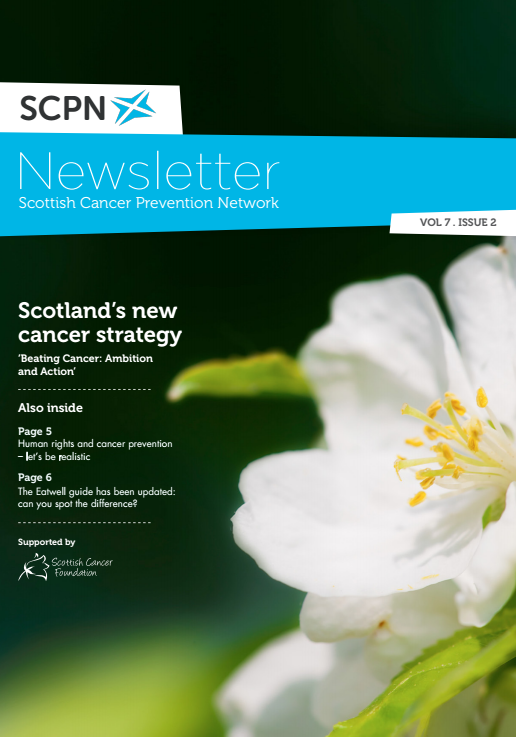
Obesity – sugar tax actions and more

16 May 16 |
Obesity increases the risk of 10 cancers including bowel, breast and advanced prostate cancer. The SCPN welcomes all actions that help the nation to avoid weight gain. Obesity Action Scotland are a national advocacy group which ‘recognises that to be successful at tackling obesity we must take a population health approach, in the same way as public health has worked to tackle other threats to health such as tobacco and alcohol. Not only must people be encouraged to stay a healthy weight and lose weight where necessary, but society and government must also create the right environmental conditions to enable the maintenance of healthy weight’.
Lorraine Tulloch, Programme Lead, Obesity Action Scotland, provides some comments on the sugar tax starting with a quote from George Osbourne (16th March 2016).
“I am not prepared to look back at my time here in this Parliament doing this job and say to my children’s generation, I’m sorry, we knew there was a problem with sugary drinks, we knew it caused disease but we ducked the difficult decisions and we did nothing. So today I can announce we will introduce a new sugar levy on the soft drinks industry…”
The Chancellor’s Budget Statement proposing the introduction of a levy on sugar sweetened drinks in 2018 came as a welcome spring surprise. Only a number of months ago the Prime Minister ruled out such a measure but pressure from a variety of sources including medical professionals, public health professionals, the Health Select Committee, Public Health England, popular TV chef Jamie Oliver and eventually from within his own party proved too strong to ignore.
The immediate reaction was of course surprise and support from us and fellow campaigners but as with all these initiatives the devil is in the detail. Whilst we welcome the announcement of the sugar levy and acknowledge this as a major step forward, we must ensure that any such tax is stringent and effective and that the monies raised are invested in effective obesity prevention programmes in Scotland.
The details of the levy mean that the proposed banding scheme will see drinks with a sugar content of 4.9gms/100mls exempt from the levy. This equates to approximately 15gms of sugar in an average can, meaning someone drinking one can of a levy-exempt-sugarsweetened-drink could still get 50% of an adult’s recommended daily intake of sugar in one hit.
There have been questions raised about the scientific justification for the two step tax approach and the sugar concentration cut off points (5 grams and 8 grams per 100ml), about why small manufacturers wouldn’t need to pay tax, the definition of a small manufacturer, and why milk-based products with added sugar wouldn’t be taxed.
As expected, the response from the soft drinks industry was one of disappointment and denial. This has been followed by many voices detracting from the sugar levy, with the most common comment being; ‘the sugar tax will not solve obesity’. We agree that the sugar tax alone will not solve our obesity crisis. Yet, this is a step in the right direction and the sugar tax plays an important role as part of a cohesive and holistic approach to tackling obesity.
There is a lot of work still to be done. Obesity Action Scotland will actively campaign for a more effective scaled volumetric tax and investigate the practicalities of such an approach as compared to the proposal. We will continue to call for more action on a suite of measures designed to make the healthy choice, the easy choice.
As well as a more effective sugar tax, we are also calling for:
- restricting marketing and promotions
- reducing sugar and fat content of foods
- improving labelling of foods bought in shops and restaurants
- reductions in portion sizes
This article was originally published in the SCPN Newsletter Volume 7, Issue 2. Read the full issue here, or read the digital edition below (great full screen on mobiles).

The SCPN Newsletter: Volume 7, Issue 2
In our second issue of 2016, Scotland's new cancer strategy, human rights and cancer prevention, the updated Eatwell guide, as well as the usual breakdown of cancer prevention research and news from the Scottish Cancer Prevention Network.